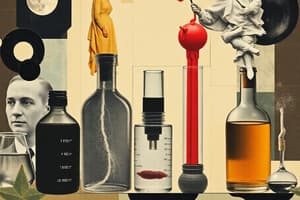Podcast
Questions and Answers
Which of the following is a hypothesis?
Which of the following is a hypothesis?
- What is a reason for squid to squirt ink?
- If a squid is attacked by a predator, it will squirt ink. (correct)
- Squid sometimes squirt ink.
- All of the evidence accumulated by scientists over many years shows that squid squirt ink to defend themselves.
A scientist wonders what causes baldness in men. This is an example of a:
A scientist wonders what causes baldness in men. This is an example of a:
- Law of nature
- Theory
- Question or problem statement (correct)
- Hypothesis
All of the facts and observations gathered in an experiment are called:
All of the facts and observations gathered in an experiment are called:
- Conclusions
- Hypothesis
- Theories
- Data (correct)
Which of the following is true about theories?
Which of the following is true about theories?
Which of the following is an example of qualitative data?
Which of the following is an example of qualitative data?
The one thing you change (or manipulate) between the experimental and control groups is:
The one thing you change (or manipulate) between the experimental and control groups is:
All of the variables that are kept the same between the experimental group and control group in an experiment are called:
All of the variables that are kept the same between the experimental group and control group in an experiment are called:
To see if baldness is caused by a high protein diet, a scientist gives one group of men a low protein diet and another group a high protein diet. What are the names of these two groups of men?
To see if baldness is caused by a high protein diet, a scientist gives one group of men a low protein diet and another group a high protein diet. What are the names of these two groups of men?
"How do bacteria cause strep throat?" is:
"How do bacteria cause strep throat?" is:
In the aforementioned experiment regarding baldness and diet, what is the DEPENDENT variable?
In the aforementioned experiment regarding baldness and diet, what is the DEPENDENT variable?
Something that you notice about the natural world is called a(n):
Something that you notice about the natural world is called a(n):
Laws and theories are similar in the sense that both:
Laws and theories are similar in the sense that both:
The effect that you are looking at in an experiment is the:
The effect that you are looking at in an experiment is the:
Through many years and many investigations by many scientists, it has been observed that living things are made of cells and that all cells come from other cells. This helps explain how living things work. This statement describes:
Through many years and many investigations by many scientists, it has been observed that living things are made of cells and that all cells come from other cells. This helps explain how living things work. This statement describes:
In an experiment, 30 squid are given vitamins and 30 squid are not given vitamins, to see if vitamins allow squid to make more ink. It was found that the average amount of ink produced in the control group (no vitamins) was 20mL per squid. The average in the experimental group was 30mL. Which of the following is a reasonable conclusion?
In an experiment, 30 squid are given vitamins and 30 squid are not given vitamins, to see if vitamins allow squid to make more ink. It was found that the average amount of ink produced in the control group (no vitamins) was 20mL per squid. The average in the experimental group was 30mL. Which of the following is a reasonable conclusion?
Flashcards are hidden until you start studying
Study Notes
Scientific Method Overview
- A hypothesis is a predictive statement based on observations, exemplified by: "If a squid is attacked by a predator, it will squirt ink."
- A question or problem statement identifies an area of inquiry, such as what causes baldness in men.
Data and Variables
- Data consists of all observations and facts collected during an experiment.
- Independent variable is the factor altered in an experiment to test its effects, contrasting experimental and control groups.
- Controlled variables are the constants maintained across both experimental and control groups to ensure fairness.
- The dependent variable is the outcome measured to assess the effect of the independent variable.
Types of Evidence
- Qualitative data refers to descriptive traits, such as colors (e.g., red and blue), while quantitative data relates to measurable quantities (e.g., 3 meters, 50 liters).
Experimental Design
- When conducting an experiment on baldness related to protein intake, groups are designated as the control group (low protein) and the experimental group (high protein).
Observations and Conclusions
- An observation signifies a noted phenomenon in the natural world.
- Theories and laws are similar as both are underpinned by extensive evidence, although theories may be subject to revision based on new data.
- A conclusion from an experiment regarding squid ink production suggests that vitamins may enhance ink output based on comparative results.
Definition Clarity
- A problem statement encapsulates inquiries like "How do bacteria cause strep throat?"
- Theories explain broader scientific principles, such as the cellular basis of life: all living things consist of cells that arise from existing cells.
Summary of Variables in Experiments
- In an experiment measuring the impact of diet on baldness, the dependent variable would be whether men develop baldness, while the independent variable involves the type of diet presented.
Conclusion Extraction
- Conclusions should logically derive from experimental data, exemplified by the conclusion regarding vitamin effects on squid ink production.
Studying That Suits You
Use AI to generate personalized quizzes and flashcards to suit your learning preferences.




